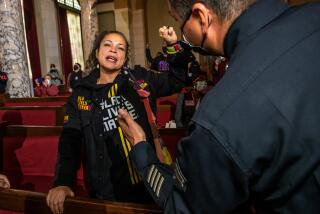Police Can Be Sued in Death, Court Rules
- Share via
WASHINGTON — The Supreme Court cleared the way Monday for a civil trial against two Huntington Park policemen who allegedly canceled emergency medical help for a man passed out on his front porch and having trouble breathing.
Instead of helping, the two officers dragged the man into his house, locked the door and left. The man, 42-year-old Juan Penilla, was found dead the next day.
Penilla’s family sued after the 1994 incident, contending that the officers displayed callous indifference toward his life and safety, and thereby violated his constitutional rights.
The city’s lawyers, hoping to head off a trial, appealed all the way to the Supreme Court, arguing that officers have “no duty” to provide medical care for citizens.
For its part, the Supreme Court has been skeptical of lawsuits against police, and the justices held on to the city’s appeal for months. Last week, they ruled unanimously that police cannot be sued for reckless high-speed pursuits that result in deaths. On Thursday, after the ruling in the police chase case, they considered Huntington Park’s appeal one more time.
On Monday, they issued a one-line order in the case denying the appeal and allowing the lawsuit to go forward in federal court.
“That’s great news,” said Danilo J. Becerra, a Montebello lawyer who represented the family. “This is a shocking case. Most police departments would not have done what was done here.”
A lawyer for the city in southeast Los Angeles County said that Officers Joseph Settles and Ioane Tua did not suspect that Penilla was in danger of dying.
“The deceased man had a lengthy history of alcohol and drug abuse,” said attorney Steven N. Skolnik. “When the officers arrived, he was passed out in the front yard and reeked of alcohol. They thought he was intoxicated, so they put a pillow under his head and figured he would sleep it off.”
Since the case has not been tried, the officers have not had a chance to give their side of the story, the city’s lawyer said.
Already, however, the case has clarified the standard for determining when police and rescue workers can be sued.
Police and other public employees can be sued for depriving a citizen of life or liberty, but not for failing to take “affirmative steps” to aid them, the high court said.
Citing that precedent, the city of Huntington Park said that the lawsuit should be thrown out.
But U.S. District Judge Richard Paez in Los Angeles and the U.S. 9th Circuit Court of Appeals said that the case was different because the two officers put the victim in greater danger.
“The officers in this case allegedly took affirmative steps that significantly increased the risk facing Penilla,” said the 9th Circuit Court. “They canceled the 911 call to the paramedics. They dragged him from his porch, where he was in public view, into an empty house. They then locked the door and left him alone. And they allegedly did so after they had examined him and found him to be in serious medical need.”
In a civil trial, a jury will hear the evidence and decide whether the officers violated the man’s rights. If so, the jurors can impose an award of damages to be paid by the city.
More to Read
Sign up for Essential California
The most important California stories and recommendations in your inbox every morning.
You may occasionally receive promotional content from the Los Angeles Times.










